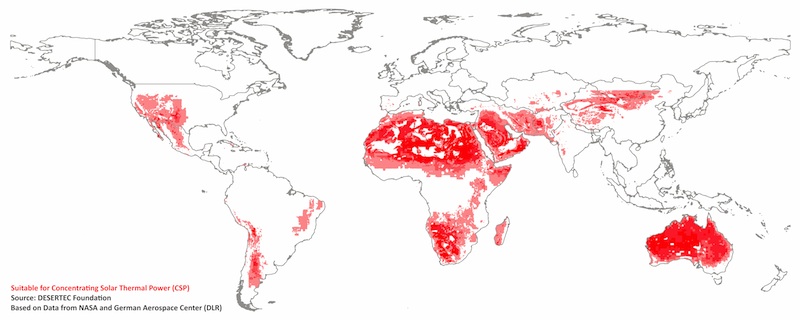Renewable energy's desert brawl


The renewable energy industry is recoiling from a nasty divorce over the weekend as the Desertec Foundation walked out for good on its commercial partner, the Desertec Industrial Initiative, setting up a possible fight over the name.
The two groups together were going to ply the world with electricity from huge solar and wind plants situated in the world's parched places. One ambitious plan called for power stations in Northern Africa and the Middle East to provide up to 20 percent of Europe's electricity by 2050.
But the eponymous organizations will now carry on their missions separately. Desertec Foundation, an international non-profit group based in Heidelberg, Germany, made clear in a blunt press release that it could no longer stand the sight of the private sector companies that were its fellow members in the Initiative (Dii).
"Today, the Desertec Foundation announced the termination of its membership with Dii GmbH," the release begins. The Foundation pulled no punches. It noted that it:
"Is taking this step as a result of many irresolvable disputes between the two entities in the area of future strategies, obligations and their communication and last but not least the managerial style of Dii’s top management. DESERTEC Foundation also wants to avoid being dragged into the maelstrom of negative publicity about the management crisis and disorientation of the industrial consortium. The dispute at the management level has already led to resentment among the partners of the DESERTEC Foundation and it negatively affects our reputation and trust."
The four-year-old Dii consortium has always faced enormous challenges, not the least of which has been eliciting the co-operation of its members from the technology, utility and finance industries, many of whom compete against each other in the open market. Late last year, Siemens and Bosch withdrew from Dii.
Its ambitious $400 billion plan to transmit electricity to Europe from the Middle East and Northern Africa (MENA) region has also had to confront political uncertainties in that part of the world, and has never had a clear regulatory remit on how to import and distribute electricity across Europe's many countries.
The emerging popularity of nuclear as a future power source in the Middle East has probably also been a factor.
Early this year, Dii backed off projections that renewable plants in MENA could furnish as much a fifth of Europe's electricity by 2050.
Cracks surfaced in the Foundation/Dii relationship in early 2012, when Dii distanced itself from a Foundation-backed project with non-Dii companies to transmit electricity to Italy from a Tunisian solar field.
A fight over the name seems likely. In its press release, the Desertec Foundation called itself "the main idea - and name-giver - for the Desertec concept." It emphasized that "Desertec Foundation is the sole owner of the brand name 'Desertec' and therefore the guardian of the concept."
Besides former members Siemens and Bosch, Dii members include industrial giant ABB, solar firms Abengoa, Schott and First Solar, and financial institution Deutsche Bank and Munich Re, among others.
At the time this story posted, Dii was still listing Desertec Foundation as a member, and had not issued a statement about the split.
Map from Desertec Foundation
More Desertec, on SmartPlanet:.
- Solar group to World Bank: Give us gas and oil's $12B, and we'll cool planet
- Oil firm's African solar farm will transmit sub-Med electricity to Italy
- Construction of world’s biggest solar project starts in 2012
- Solar v Solar: Gloves come off at G20 summit
The Middle East is going nuclear:
This post was originally published on Smartplanet.com